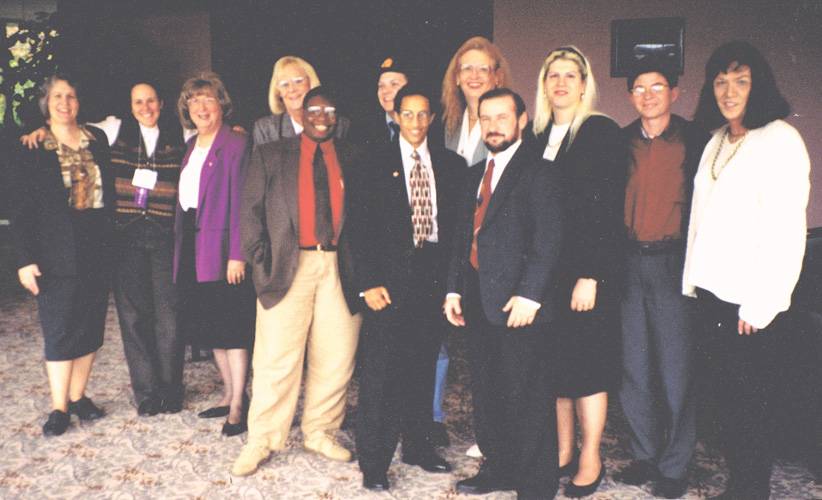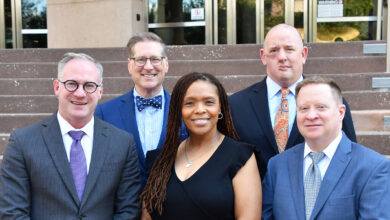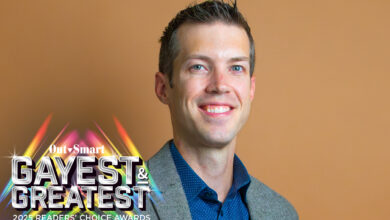
She Opened Doors

Judge Phyllis Randolph Frye reflects on the 20th anniversary of the Transgender Law Conference
by Michelle Risher
The 1992 International Conference on Transgender Law and Employment Policy (ICTLEP), held 20 years ago this month in Houston, was a pivotal event in the ongoing battle for transgender rights. On the 20th anniversary of this series of six conferences, Houston’s first transgender judge, Phyllis Randolph Frye, reflects on its success in bringing activists together to discuss transgender equality legislation needed in the areas of housing, insurance, probate, employment, healthcare, military service, as well as criminal and family law.
“ICTLEP began out of frustration, and with the help of grass-roots activists,” writes Judge Frye on her Liberating Law website. As the 1992 participants gathered at a Hilton hotel on the Southwest Freeway, they were greeted by the hotel’s marquee that read Welcome Transgender Law Conference—the result of special negotiations with the hotel.
Frye was then a practicing trial attorney who had kicked open her transgender closet door long before 1992. She approached Merrissa Sherrill Lynn, the executive director of the International Foundation for Gender Education (IFGE), at a local fundraiser in 1991 with her idea for a moveable annual meeting devoted to transgender equality legislation.
Frye was also running for vice-president of the Gulf Coast Transgender Community (GCTC) in the fall of 1991. Jackie Thorne, then GCTC president, recalls that Frye approached the GCTC board in 1992 and said that she would like to start “a conference specifically targeting transgender law—what is current, what we need, and how to implement it.” The board told Frye they would support her and make funding available.
Frye recalls that Linda and Cynthia Phillips, organizers of the annual Texas T-Party, were instrumental in publicizing the ICTLEP conferences. The T-Party had a large mailing list, and their events drew at least 300 people. Frye always got T-Party workshop space, waived fees, and brochures placed in all of the Phillips mail-outs. “Without the Texas T-Party, I would have only reached half of the people I reached,” says Frye.
Those six ICTLEP conferences produced many landmark documents, including the 1993 Health Law Standards of Care for Transsexualism, the 1993 Policy for the Imprisoned Transgendered, the 1996 International Bill of Gender Rights, and a joint statement with the National Center for Lesbian Rights clarifying their shared position that Gender Identity Disorder should be a medical rather than a psychiatric diagnosis.
These documents, as well as transcripts of the first five conferences, other writings, reminiscences, and photos can be found at liberatinglaw.com under Phyllis Frye Articles and then under Phyllis’s Bio.
Merging into the Mainstream
By 1997, the National LGBT Bar Association (then known as the National Lesbian and Gay Law Association) was becoming much more supportive of transgender inclusion. They had transgender workshops at their annual Lavender Law Conferences, and they placed transgender speakers on various panels. They became an affiliate of the American Bar Association in 1992 and now work closely with the ABA’s Section on Individual Rights and Responsibilities, as well as its Committee on Sexual Orientation and Gender Identity. In January of 1995, they were the first national organization to call for transgender inclusion in the federal Employment Non-Discrimination Act (ENDA).
“I think one of the direct results of ICTLEP is the transgender-inclusive ENDA bill. Another direct result is the EEOC’s recent decision to include transgender persons [in their polices]. The people we trained were pushing all of that. So that was it—ICTLEP started the whole damned thing.”
By that time, Frye and Sharon Stuart were “it” as far as the structure of ICTLEP went, and they decided to declare victory and make a statement that ICTLEP was going to fold. “NLGLA was already doing what ICTLEP had been formed to do. They were absorbing all of our stuff, and that was fine.
“Every year, on the day before the National LGBT Bar Association begins its annual Lavender Law Conference, there is a Transgender Law Institute. It’s open to lawyers who practice transgender law. This will be the third year. If anybody wants to support transgender law issues, they need to join the National LGBT Bar Association and go to Lavender Law and the Transgender Law Institute.
“ICTLEP did what it was supposed to do. It trained the grass-roots people. Almost everybody that is an activist for transgender rights in this country either attended an ICTLEP conference or is someone—one, two, three, or four generations on—who’s been trained by those people. Thus, I’m the grandmother of the national legal and political transgender movement.”
ICTLEP’s greatest accomplishment, Frye says, is that “it gave direction and purpose and training to the generations of grassroots transgender activists who went around the country in the early and mid-’90s to eventually touch the Tammy Baldwins, and people in other states. Jen Levi is a staff attorney with GLAAD in the northeast—I trained him. Paisley Currah was at ICTLEP, and he has the Transgender Law and Policy Institute online. I think, with the exception of two people, that every national or regional leader in the transgender community was at the third ICTLEP conference in 1994.”
Looking to the Future
“There are still problems. In the same-sex marriage fight, it is always ‘lesbian-gay, lesbian-gay, lesbian-gay.’ I continue to say, ‘You know, transgender people are having marriage problems too.’ But I’ve got to say that during the last 12 months there’s been such an explosion in everything you read. I’m talking about straight media, the Houston Chronicle . . . I watch MSNBC almost exclusively, [and almost every commentator uses the term ‘LGBT’]. Transgender inclusion has really taken off.”
She said that the highest priority for the transgender community is to field transgender candidates for elective office. “The fact that I became the first transgender judge in 2010 is ridiculous. [Around that same time] Vicky Kolakowski got elected to a district court in California—a much bigger court than I serve. In the whole country, there are two of us.” (Frye was not the first openly transgender person appointed in Houston, however—that honor goes to Jenifer Rene Pool, who was appointed to serve on the Buildings and Standards Commission in 2008 by Mayor Bill White.)
Frye responds without hesitation when asked what she would liked to be remembered for. “Oh, I decided that a long time ago. I told my wife, if I go first, to put ‘She opened doors’ on my gravestone. That’s it. I opened doors.”
Many would agree that Judge Frye has not only opened doors, but punched some gaping holes in the established social and political fabric. The groundbreaking organization she developed 20 years ago was an important umbrella that sheltered the entire transgender community and its allies. But perhaps best of all, she continues to open a lot of hearts and minds along the way.
Michelle Risher is a freelance writer who lives in Houston, Texas.










